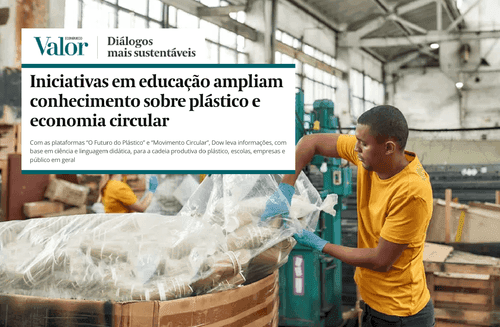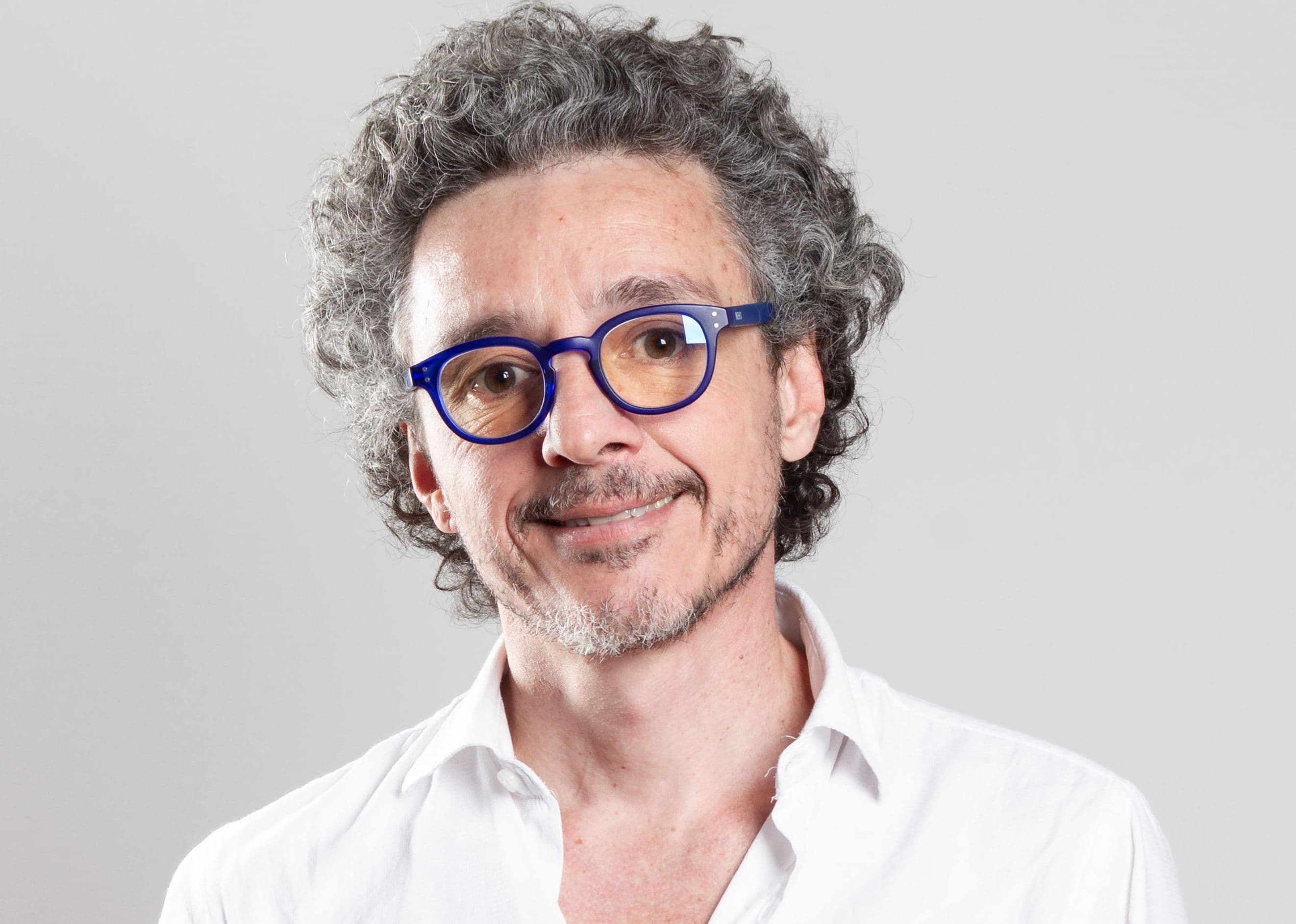
29/07/2021
Circular Movement at Valor Econômico
Look how incredible: the Circular Movement made the news at Valor Econômico on 07/16 as an example of an initiative for a more sustainable world! Check it out in full:
Education initiatives expand knowledge about plastic and circular economy
Transforming production processes that operate from a linear to a circular economy logic is not a trivial task, and demands the involvement of the whole society. However, for this mobilization to take place, it is necessary to increase knowledge around what the circular economy is and how it contributes to the solutions of many of the current environmental, economic and social challenges. For this reason, Dow has developed two initiatives in the area of education: the “Futuro do Plástico” and “Circular Movement” platforms. Each is aimed at a different audience, but they have the same objective: to bring information based on science and in a didactic way about the circular economy, encouraging debate and the joint search for solutions.
The “Futuro do Plástico” platform, launched this week, is specifically aimed at converters and transformers in the plastic chain. In this initiative, Dow proposes to lead these organizations on a journey to know, visualize and reach a future based on the circularity of plastic. The platform provides information on the circular economy and plastic challenges, presents initiatives and people who work on this topic, and a quiz for visitors to find out at what level their organization is on the sustainability journey.
The “Circular Movement” platform, which began in 2020, has as its main target audience teachers and students and proposes the construction of a “world without garbage”, that is, a planet in which waste is eliminated because of the resources that already taken from nature are continuously reused, recycled or reused.
Created in partnership with Atina Educação, the online platform brings teaching materials aligned with the Common National Curriculum Base (BNCC), focusing on themes such as cities, food and industry, and a map of initiatives around the world that intend to eliminate waste. The content can also be used by companies that want to explain the circular economy to their employees and the general public.
According to Mariana Orsini, Director of Government Relations at Dow, society demands actions from industries in terms of sustainability, including the topic of plastic and, in order to participate in this debate, the company focuses on two strategies. “The first is to connect with the final consumer, that is, with the citizen who has a more critical view of plastic and packaging on a daily basis and, therefore, expects companies to mobilize. And the other is to encourage our chain to provide answers to these challenges”, she says.
Thus, the two initiatives are part of the company's contribution, through the promotion of education for the circular economy. “In our view, education, clarity and science are what make Dow a materials science company recognized for its commitment to sustainability,” she says.
Education as a path to change
Dow's investment of efforts and resources in education is based on the conviction that education is a transforming agent in society. In his doctoral thesis, Edson Grandisoli, educational coordinator of the Circular Movement, showed that an educational work focused on projects that deal with the search for solutions related to the problem of solid waste, was effective in expanding the knowledge of the participants and in changing behaviors to long-term, contributing to the formation of more active citizens who are aware of their role as agents of socio-environmental transformation.
In May 2020, an article published by the World Economic Forum discussed how the Covid-19 pandemic made society rethink the plastics issue and that “corporations and governments around the world should allocate more resources to educate people about how the economy circular works and why they should reuse and recycle”. Consumers need, the article says, to be encouraged to see themselves as responsible for the proper disposal of any product and for reintroducing it into the economic cycle. In parallel, the text also encourages the production of plastic with better recyclability, so that it can be used again more easily.
Another study, this time by the National Confederation of Industry (CNI), entitled “Circular Economy – opportunities and challenges for Brazilian industry”, mentions education as a facilitator of the circular economy. According to the document, it is necessary to create conditions that facilitate the viability of the circular economy in all its potential and scale, including “better quality education, specific public policies, infrastructure aimed at circularity and innovative technologies”.
Future vision for plastic
Also according to Mariana Orsini, there is already a view that plastic, if used well, brings many benefits, including reducing the carbon footprint. For this, its insertion in the circular economy is important. “But there is still the challenge for the industry to organize itself to reach this vision of the future. That's why the Future of Plastics platform was created. We invite our customers to see that plastic has a future, and it goes through circularity.”
For Paulo Henrique Rangel Teixeira, superintendent director of the Brazilian Plastic Industry Association (Abiplast), the circular economy meets society's desire for objects and products not to lose their function. This ranges from developing new ways of designing products to showing the opportunities that arise for companies. “This is the DNA of plastic: durability, circularity. Anyone who sees this way has already started to see a movement within this logic. But without articulation it can become chaotic. It's a collective construction”, he says. Hubs such as the Futuro do Plástico platform, says Teixeira, “bring several collaborators to oxygenate the problems and think”, and he emphasizes that the solution is in everyone.
Movement by the end of waste
The Circular Movement has at its core to produce materials with scientific basis and simplicity, and that are accessible and free. To test the platform, a group of 40 teachers from schools at the Centro Paula Souza were invited to participate in training on its content. The center is an autarchy of the state government of São Paulo that administers technical schools (Etecs) and Faculties of Technology (Fatecs) in the state. In the end, 83% of them said they felt more skilled in the circular economy and ready to activate projects with their students.
“We are communicating science in a different way”, says Sueli Furlan, head of the Department of Geography at the Faculty of Philosophy, Letters and Human Sciences (FFLCH) of the University of São Paulo and responsible for the contents of Atina Educação. In the elaboration of the Circular Movement material, she explains, an attempt was made to do something contemporary, that would bring industry, schools and society together and that would encourage people to think about how everyone can make a difference.
As an example, she cites the issue of Sustainable Development Goals (SDGs), which, as they do not have a school language, are more difficult to apply in classes. “The Circular Movement material already explains which ODS are related. This was a very good moment for this project: to be able to pay attention to this issue. It's a way to invite and excite teachers.” Mariana Orsini also reinforces the alignment of contents to the BNCC. "We had, with Atina, the concern of preparing material that would objectively serve the teacher, as part of what he has to do as an activity in class."
“These platforms are unique in the world,” says Orsini. “The Circular Movement platform is being expanded to other countries in Latin America. This highlights how Dow in Brazil has an innovative spirit.”
https://valor.globo.com/sponsored/dow/dialogos-mais-sustentaveis/noticia/2021/07/16/iniciativas-em-educacao-ampliam-knowledge-sobre-plastico-e-economia-circular. ghtml

